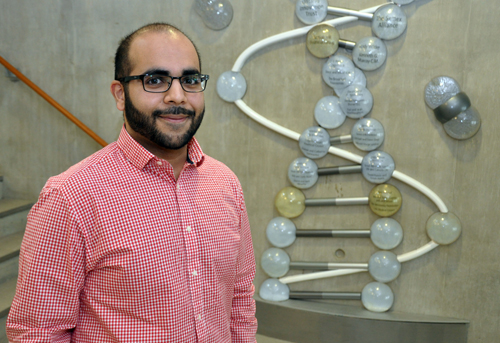
Your genetic makeup determines everything from your hair and eye colour to your susceptibility to disease, but simple dietary changes can help reduce your risk of developing certain conditions.
“Not enough focus goes into prevention,” says Sarthak Matravadia, a PhD student in Human Health and Nutritional Sciences (HHNS). “We often think about treatment for an existing problem, but nutrition is a powerful tool for prevention.”
Although omega-3 fatty acids often receive positive publicity for such benefits as improving cardiovascular health, he says, controversy surrounds these fatty acids and how beneficial they really are. Researchers remain divided on their role in the body, how they work and how much people need to consume daily to achieve any health benefits.
“There’s so much controversy,” he says. “It’s a great time to be an omega-3 researcher.”
Not all fatty acids are created equal, and not all of them have the same health benefits. Since the body can’t produce certain fatty acids, it needs to get them from food or supplements. Dietary sources of omega-3 and omega-6 fatty acids include fish, eggs, nuts and seeds.
Some experts believe the typical North American diet contains too many omega-6 fatty acids and not enough omega-3s.
Omega-6 fatty acids have been implicated in promoting inflammation in the body, which can lead to insulin resistance and diabetes. Omega-3 fatty acids have been shown to produce anti-inflammatory effects in the body.
“You can’t broadly characterize these fats as all being bad or all being good,” says Matravadia. He says some fatty acids might have been unfairly vilified while others have received undeserved praise.
In his study, he worked with rats that were genetically predisposed to become obese and pre-diabetic by 15 weeks of age. The rats were given a genetic mutation affecting leptin, which controls appetite. A defective gene inhibits the rats’ ability to feel full and causes them to overeat.
At five weeks of age, the rats received a diet containing either omega-3 or omega-6 fatty acids, which prevented them from developing insulin resistance. The rats also appeared to be more active. He says the fatty acids may affect how mitochondria in cells metabolize fats.
Up to 80 per cent of sugar in the bloodstream feeds muscle tissue, says Matravadia, so if there’s a problem with how the body produces or uses insulin, muscle tissue is the first place to look. The study found that both types of fatty acids maintained insulin sensitivity by promoting insulin signalling in the muscle.
He says guidelines for daily fatty acid consumption vary with age and other factors. Pregnant women are advised to increase their intake of fatty acids to support their babies’ development. Canadians on average consume about 150 milligrams of fatty acids daily; some health experts recommend consuming up to 1,000 milligrams per day.
“The consensus is that they are beneficial,” says Matravadia, “and we need to generally increase our consumption of omega-3s as a whole.”
He says his study findings offer hope for people genetically predisposed to diabetes, because their diet can help to prevent the condition.
“We’ve established a great link to the preservative effects of these fats,” says Matravadia. “Prevention is gaining a lot of interest. You realize that, if you can prevent a problem in the first place, you can save a lot of the economic costs of health care.”
Since both of his parents have diabetes, he feared the same fate for himself. “We’ve lost people in our family due to health issues related to diabetes and cardiovascular disease, and often that’s because of lifestyle choices but also genetics.”
Matravadia wanted to learn more about how diet can help prevent disease, especially after his doctor told him several years ago that he needed to lose weight if he wanted to avoid developing diabetes. He says he noticed a big improvement in his health when he changed his diet and started an exercise regimen.
“Genetic predisposition is a scary thing because you think you don’t have control, and when you don’t have control you feel helpless. Nutrition is a powerful tool in our control.”
His research was co-supervised by HHNS Profs. David Mutch and Graham Holloway.